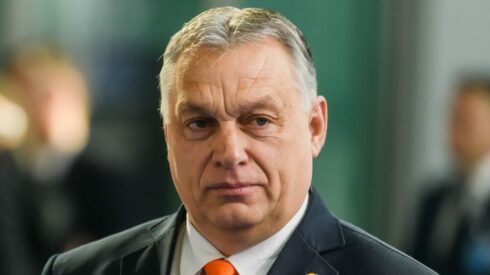Hungary will defend its home, its language, its culture, and will not give into Western European “imperial” ambitions, the Hungarian Prime Minister said in his speech at Tusványos.
Written by Zoltán Kottász. Originally published on The European Conservative
In a state of anxiety and feeling trapped, the European Union has chosen “decoupling” and “de-risking” instead of connecting to the world, thereby losing its global competitiveness, according to the Prime Minister of Hungary, Viktor Orbán, who gave a speech on Saturday, July 22, at Tusványos, a conservative political gathering in Transylvania.
As with every speech he has made in the past at the Tusványos Summer University in Băile Tușnad, Romania, Viktor Orbán once again reflected on the most important geopolitical trends, European current affairs, and their impact on Hungary. He believes the EU is “rich and weak,” and it is isolating itself in a world with many uncertainties, in which the balance of power has tilted. To underline his message, the prime minister cited the International Monetary Fund’s (IMF) report, which forecasts that neither the United Kingdom nor France or Italy will be among the world’s ten largest economies by 2030, while Germany will drop to tenth place.
Orbán noted that once-ambitious plans to have a free trade area from “Lisbon to Vladivostok” are now being replaced by the EU’s actions that are decoupling Europe from Russia through sanctions.
Of course, you can decouple the EU from Russian energy, but Russian raw materials will be bought by someone else, whilst we bear the inflation costs and lose our competitiveness.
He also noted that large Western European companies are not following in the footsteps of the EU: of the original 1,400 companies doing business in Russia, only 8.5% have left the Russian market since the start of the Ukraine war last year.
Viktor Orbán also said that the balance of global power is shifting in such a rapid way that the world has never witnessed before. “The USA’s dominance on the world stage is constantly waning. They are not happy, they want to stay on top of the world forever,” Orbán said, referring to China’s political, economic, and military rise. He believes China wants to “end centuries of humiliation” and seize back its dominance over Asia, and the creation of China-led international organisations, such as BRICS, the Asian Infrastructure Investment Bank, and the One Belt One Road initiative, already reflect these ambitions. In addition, China despises the West’s “global values,” which it sees as a philosophy hostile to the rest of the non-Western world. Viktor Orbán maintains that the world is heading towards a collision, which can only be prevented if world leaders find a new balance.
The prime minister also touched on the heated debate in the EU between the supporters of a federal Europe and the forces that believe in national sovereignty. He emphasised that Hungary has to stay on the course it decided to take in 2010, when his conservative party Fidesz came into power and has since won every general election, each time gaining a two-thirds majority in parliament. Viktor Orbán stressed that the political conflict between EU institutions and Hungary is based on the Hungarian Constitution that came into force in 2012.
“The new Hungarian Constitution differentiates us the most clearly from other European countries,” stated Orbán, saying that while other constitutions focus on individual rights, the Hungarian one—a national, Christian constitution—is based upon the collective, the nation, the culture, and the language, and therefore stands in the way of Western European “imperial” ambitions to push forward the migration and ‘LGBT’ agendas throughout the EU.
We have a common home, a common language, a common culture; these form the basis of our freedom and our well-being, which we have to protect. We will not give in to political and financial blackmail or make compromises because we insist on defending our rights.
Viktor Orbán’s previous speeches at Tusványos have caused controversy and provoked reactions from many leading politicians in Europe. In 2014, for example, he stated that “the new state that we are constructing in Hungary is an illiberal state, a non-liberal state.” In 2018, he warned of the dangers of angering Russia: “We have to be aware that Russia sees itself as a country that is not safe unless it is surrounded by buffer zones. Therefore, Russia will continue to strive to create buffer zones around itself, just as it has done up until now. Ukraine is one of the victims of this.”
On Saturday, a handful of nationalist Romanian protesters tried to disrupt the event by staging a protest, waving Romanian flags, and shouting offensive chants at the Hungarian attendees. They even tussled with the police, who came out in large numbers to maintain order. Băile Tușnad is in the heart of Transylvania, which had historically belonged to the Kingdom of Hungary and still has a sizable ethnic Hungarian population.
Zoltán Kottász is a journalist for The European Conservative, based in Brussels. He worked for many years as a journalist and as the editor of the foreign desk at the Hungarian daily, Magyar Nemzet. He focuses primarily on European politics.





österr. verfassung wertlos, wenn sie nicht eingehalten wird
if hungaria refuse gay parades in all hungarian cities, they cant be in eu.
a genuine european statesman at odds with the neo communist-fascist hybrid bureaucracy in brussels which should be dismantled as a threat to democracy and which works against the european peoples.